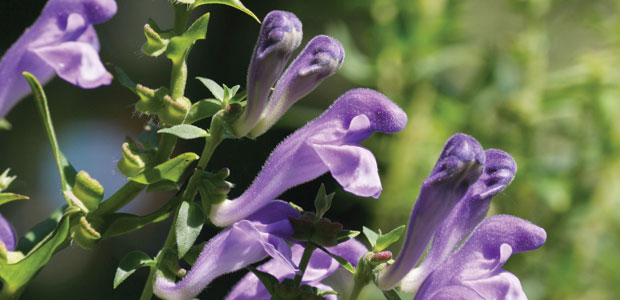Advertisement
Stressed?
Stress, nervous tension, anxiety, fatigue, insomnia, and exhaustion are complaints that can interfere with a good night’s sleep, relationships, jobs, and participation in and enjoyment of leisure activities. Instead of relying on prescription drugs or over-the-counter medications to help cope, there may be a more natural alternative: skullcap. Skullcap’s Back Skullcap (Scutellaria lateriflora), a herb … Continued

Stress, nervous tension, anxiety, fatigue, insomnia, and exhaustion are complaints that can interfere with a good night’s sleep, relationships, jobs, and participation in and enjoyment of leisure activities.
Instead of relying on prescription drugs or over-the-counter medications to help cope, there may be a more natural alternative: skullcap.
Skullcap’s Back
Skullcap (Scutellaria lateriflora), a herb with a long-standing history of traditional use, is making a comeback. It was listed in the United States Pharmacopeia, the standard drug reference from 1863 to 1916, and in the National Formulary, the pharmacists’ reference until 1947, as a remedy for a variety of nervous conditions including seizures and epilepsy. Although never scientifically proven, skullcap was also claimed to have been used as a treatment for rabies, hence its common names, mad-dog weed and mad weed.
Skullcap is a perennial in the mint family that grows wild in much of Canada and the United States. A tincture or standard infusion made from the fresh or recently dried aerial parts are considered by herbalists to be an effective nervine, the botanical equivalent to pharmaceutical sedatives and tranquilizers.
Nervines do not cause excessive drowsiness, mental fogginess, or slow reaction times and in most cases do not have a mood-altering effect as do some of the tricyclic pharmaceuticals, benzodiazepines, or serotonin agonists. In addition, nervine herbs such as skullcap do not interfere with respiration or digestion, do not suppress the REM phase of sleep, and are not considered habit forming.
Skullcap is also an antispasmodic, nerve tonic, and analgesic, making it one of the most relevant herbs for supporting and nourishing the nervous system, calming stress, and relieving anxiety, muscular tension, nerve pain, and headaches, especially when used in combination with other complementary herbs.
Skullcap can be used with cardiovascular herbs in the treatment of hypertension and with hormone-balancing herbs for emotionally disruptive premenstrual symptoms. When combined with respiratory antispasmodic herbs, skullcap is effective for stress-induced asthma or panic attacks and provides relief from stress headaches when used with different analgesic herbs.
When taken as a tea or tincture up to three times a day, skullcap helps with insomnia triggered by muscular pain, twitchy muscles, neuralgia, or restless leg syndrome. Skullcap is also a valuable therapy for weaning individuals from barbiturate addiction and to lessen the symptoms of nicotine and alcohol withdrawal.
While the benefits of skullcap are based primarily on years of traditional use and clinical practice, there is scientific evidence of its efficacy. In 2003 a small double-blind, placebo-controlled study of healthy participants using skullcap demonstrated a positive effect in reducing anxiety levels, and a 2004 study involving rats with induced epilepsy showed that skullcap suppressed the seizures during treatment.
There have been isolated reports of hepatotoxicity associated with some commercial skullcap products. The studies linking skullcap with liver toxicity, however, were not conclusive. To be safe, use skullcap under the guidance of a qualified health care practitioner.
Asian Relation
Chinese skullcap (Scutellaria baicalensis), or huang qin, has very different medicinal properties and is not interchangeable with Scutellaria lateriflora. The roots are used in traditional Chinese medicine both in formulas and patent medicines and are a rich source of protective flavonoids including baicalein. This flavonoid is currently being researched for its anti-inflammatory, anti-allergenic, tumour-suppressing, antiviral, and antibacterial effects, along with other health benefits.
Experimental research indicates that various cancer cells can be prevented from multiplying and metastasizing to other tissues in the presence of baicalein and that this flavonoid assists the immune system in destroying tumour cells. Other studies show that baicalein induces apoptosis (programmed cell death) of many different human cancer cells.
The impressive anti-inflammatory effects of baicalein may be beneficial for treating arthritis and gum inflammation. Its antiviral properties are also being studied as an alternative therapy for HIV-positive and AIDS patients, and research has also been conducted into its traditional use for asthma and allergic dermatitis. Pending further studies, the antioxidant and anti-inflammatory actions of baicalein seem to inhibit free-radical damage to brain cells, suggesting Chinese skullcap may be useful in preventing and managing Alzheimer’s, Parkinson’s disease, and multiple sclerosis.
Despite its rather ominous-sounding name, there are many reasons why skullcap is a valuable tool in a herbalist’s kit. Talk to a herbalist or other qualified health practitioner for a dosage that is right for you.




